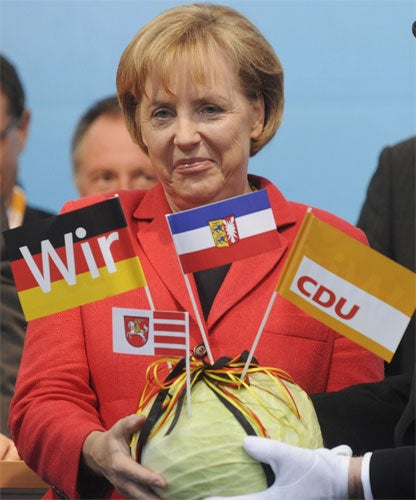Coalition plans under threat as Merkel sees poll lead slip
Social Democratic gains could scupper hopes of new right-wing alliance

A slow, but steady, tightening of the poll numbers in Germany is threatening Angela Merkel's hopes of forming a new centre-right coalition, and could, if it accelerates, even complicate her ambition to serve a second term as Chancellor.
Opinion polls taken over the past week have shown Ms Merkel's CDU-CSU alliance losing ground to Germany's second largest party, the Social Democrats, led by Frank-Walter Steinmeier. The decline is not dramatic, but it is enough to mean that no possibility should be ruled out when Germans go to the polls on Sunday.
Until now, it has been taken pretty much for granted that Ms Merkel will be returned to power, probably at the head of a coalition with the free-market FDP, or – failing that – in a continuation of the so-called Grand coalition with the Social Democrats (SPD). The Chancellor has made no secret of her strong preference for joining up with the FDP, whose flagship policies are business-friendly tax cuts and an end to the phasing out of nuclear power.
With only four days of campaigning left, however, it seems that some German voters at least may be getting cold feet about the prospect of abandoning what has been widely regarded as a successful combination.
Results in local elections held over the weekend confirmed trends in local elections over the past month, where not only the Social Democrats, but also the hard-left party, the Left, have done better than projected. The CDU, in contrast, has made losses. While local elections may be fought on different issues from national ballots, it is not impossible that the strength of the left and centre-left vote is being underestimated.
A poll from Demoskopie Allensbach, published yesterday, showed the CDU-CSU at 35 per cent (1 point down on a week before), the SPD gaining 1.5 points, to stand at 24 per cent, with the FDP a point up at 13.5 per cent. The Greens, 11 per cent, had lost a point, while the Left lost 0.5 per cent to stand at 11.5.
German parties are known by their colours and as things stand, a black-yellow government (CDU-FDP), remains possible and so long as the FDP's gains equal or outstrip the CDU-CSU's losses, Ms Merkel's preferred coalition remains possible. But any more gains by the Socialists, and the current Grand coalition between the two biggest parties looks the more likely outcome.
The proportional system also means that the results can be complicated, to a surprising degree, by the smaller parties. Until now, the centre-left SPD have been adamantly opposed to aligning themselves with the hard left, preferring the Greens. This is the alliance that produced the red-green coalition led by Gerhard Schröder, which Ms Merkel defeated four years ago. But in recent days the SPD has seemed less categorical about not joining forces with the Left at any cost. A strong performance by the Left, plus a better-than-forecast showing by the SPD, could just open the way for a red-green plus Left coalition.
If the Social Democrats do much better than expected, then the FDP could find themselves being wooed by both major parties, with the so-called "traffic light" coalition – red, yellow, green – a possibility. There is also the "Jamaica" variant whereby Ms Merkel could try to augment her black-yellow alliance, with – however improbable that might seem – the Greens.
This election has also seen a proliferation of small grassroots parties, including a German equivalent of the Swedish Pirate Party, advocating a free and open internet. A strong youth vote for the Pirates introduces another unknown into the equation. Why young people would be attracted to the Pirate Party is obvious. But there are compelling reasons, too, why the polls are shifting as they are, and why they might shift more before Sunday.
Although Ms Merkel looks certain of a strong personal vote, her preference for a partnership with the FDP is causing jitters among some who worry about a lurch to the right.
Ms Merkel may also have been harmed not only by her lacklustre campaigning but by her decision not to do much campaigning at all. She will be in Pittsburgh today and tomorrow for the G20 meeting, which will give her publicity of a kind, but remove her from the cut and thrust of a campaign that is becoming closer by the day.
Join our commenting forum
Join thought-provoking conversations, follow other Independent readers and see their replies
Comments